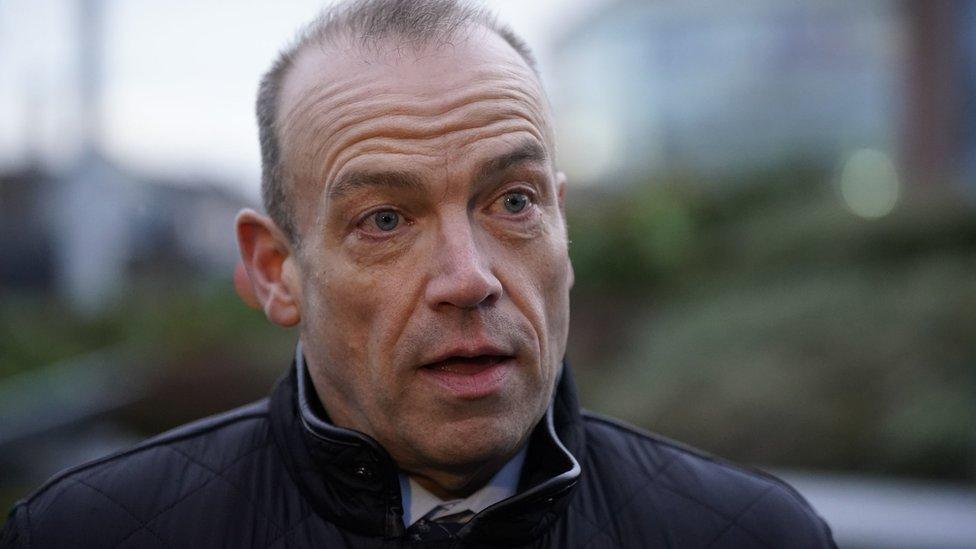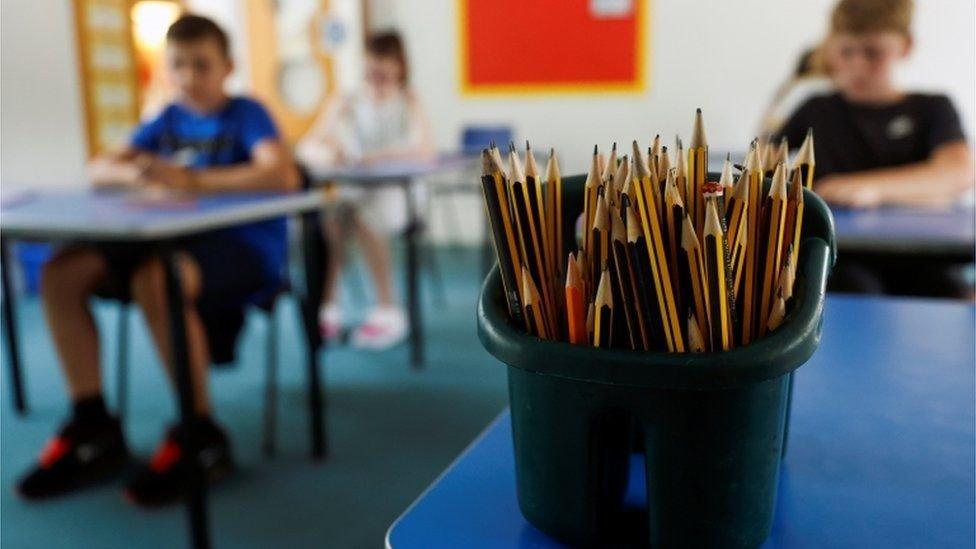NI education system faces funding crisis, school leaders warn
- Published
- comments

Leaders of seven bodies representing all schools and the four main churches have written a letter warning of a crisis in education funding.
The unprecedented joint letter has been sent to the Northern Ireland secretary and the head of the civil service.
On Tuesday, the Education Authority (EA) said it could not make £110m in savings this year.
In the said under-investment in schools would affect "every child and young person".
The letter to Chris Heaton-Harris and Jayne Brady has been signed by the chief executive of the Council for Catholic Maintained Schools (CCMS) Gerry Campbell and Controlled Schools Support Council (CSSC) Mark Baker.
The chief executive of the Northern Ireland Council for Integrated Education, Roisin Marshall, has also signed, as has the head of the Irish-medium body Comhairle na Gaelscolaíochta Maria Thomasson, and the Catholic Schools' Trustee Service Fintan Murphy.
Nuala O'Neill, the chief executive of the Governing Bodies Association, which represents many grammars, and Dr Andrew Brown, the chair of the Transferor Representatives' Council - which represents the three main Protestant churches - complete the signatories.

Chris Heaton-Harris previously warned that the Department for Education needed to live within its budget
In the letter they said they "would be failing the children and young people of Northern Ireland if we did not share our significant concerns about the impact of the current crisis in education funding."
"Without question, reduction in funding and ongoing under investment will negatively impact the quality of education of every child and young person living in NI," they continued.
The letter also said that less was spent on each child's education in Northern Ireland than in England, Scotland or Wales.
According to previous analysis by the Institute for Fiscal Studies (IFS), Northern Ireland spends less on each school pupil's education than any other part of the UK.
"Why is the education of a young person in NI valued less than those in England, Scotland and Wales?" the letter asked.
They also said Chancellor Jeremy Hunt had provided £2.3bn of additional funding for schools in England in his autumn statement in November 2022.
"Why is there such a lack of equality between the important funding commitments given to English pupils and our children and young people?" the leaders' letter asked.
Their letter concluded by calling for "an urgent meeting involving everyone with a concern for the future of our children and young people".
'Negative impact for generations'
"The focus must be on the restoration of education funding to levels that can fully support the needs of schools and ensure children have the best start in life," it said.
"Failure to address this problem will have a negative impact for many generations to come."
At almost £2.5bn, the education budget is Stormont's second largest behind health.
In his November 2022 budget, Mr Heaton-Harris provided education will a cash increase of £286m compared to the baseline in 2021-22.
But he also warned that the Department of Education (DE) would need to take action to live within its budget, and to make significant cuts to its "current spending trajectory".
The EA subsequently said it could not deliver around £110m of savings it was required to make by the end of March.
The authority expects more than half of over 1000 schools in Northern Ireland to be in the red by March 2023 and is warning of a school maintenance backlog of £500m.
Warning from ex-civil servant
The warning comes as a former head of Northern Ireland's civil service said Stormont's Executive departments could be facing about £1bn of pressures and cuts in the next financial year.
Speaking on BBC's The View programme, Sir David Sterling said senior civil servants who had been left to manage public services had been put in an uncertain position in the absence of a functioning executive.
Sir David also suggested that there could be double digit increases in the regional rate.
"My understanding is that the [Northern Ireland] secretary of state has given a commitment to produce a budget before the start of the financial year in April - one of the things he will have to do is decide how much to increase the regional rate," he said.
"I am reminded that in 2005 Peter Hain, who was secretary of state during that period of direct rule, increased the regional rate by 19%.
"That was, in a sense, almost saying: 'If the people of NI aren't going to govern themselves I am going to take some tough decisions,' and I wouldn't be surprised if we didn't see something similar again."
Related topics
- Published18 January 2023

- Published24 November 2022
